Rahimafrooz Renewable Energy Limited (RREL), a subsidiary of the Bangladesh conglomerate Rahimfrooz, provides solar power to parts of Bangladesh. As part of RREL’s goal to expand their services, they would like to identify sources of productive use of solar mini-grid generated energy that they can pair with their existing portfolio. This project is to develop a model that will allow RREL to assess different alternatives and examine the financial prospects of a few preliminary recommended uses.
This primer provides a comprehensive but non-technical overview of the distinct health information systems (HIS) that all together support health care delivery in low-resource settings. It opens with a historical account and landscape assessment and describes the urgent need to build a lean rigorous HIS that integrates these different components. Subsequent sections describe the individual systems that: i) track individual patient and health care provider information; ii) directly document care delivery; iii) provide public and population health data; iv) support facilities’ and community health workers’ administrative and financial functions; and v) coordinate logistics and health commodities supply chains. A separate section describes imported data, including “master data” and manufactured (e.g., “meta”) data. The primer closes with recommendations for principled HIS stewardship.
WDI is working with local partners to develop a proposal for a pilot mini-grid project that would seek to implement a mini-grid for productive use in the village of Bagdumur in Bangladesh. The pilot would seek to determine the parameters under which the financial performance of the mini-grid business model is commercially viable. The pilot would also seek to determine the types of economically productive use that can be facilitated within the village to provide sufficient demand at price levels that are commercially viable.
WDI reviewed and documented lessons learned by the Global Alliance for Clean Cookstoves (the Alliance) since its inception. The Alliance is a public-private partnership hosted by the United Nations Foundation that aims to save lives, improve livelihoods, empower women, and protect the environment by creating an efficient and thriving global market for clean and efficient household cooking solutions. The alliance’s goal is to facilitate the creation of a market that enables 100 million households in developing countries to access clean cooking solutions by 2020. Through interviews with staff and alliance partners in Washington, D.C., Kenya and Bangladesh, WDI sought to identify which of the alliance’s efforts focused on building the market for clean cooking solutions have worked, which of these efforts have been less successful, and how these outcomes might be translated into lessons learned and strategic options for the alliance. WDI also sought to develop insights that could be beneficial for other organizations interested in a global approach to market creation in low income settings. This work also resulted in the development of a conceptual framework for how to accelerate impact industries, which was the subject of an article published online by The Stanford Social Innovation Review in June 2018.
Stanford Social Innovation Review article.
Colm Fay will participate in a panel discussion hosted by the Alliance at SOCAP 2018
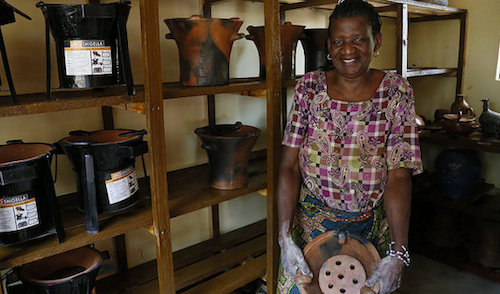
An article published in the Stanford Social Innovation Review website and written by two WDI researchers showcases a framework for accelerating impact industries, those made up of profit-seeking, scalable businesses that also seek to create substantial social and/or environmental impacts.
Written by Colm Fay, who leads WDI’s Scaling Impact and Energy initiatives, and WDI Senior Research Fellow Ted London, this piece features a conceptual framework developed while working on a 2017 study for the Global Alliance for Clean Cookstoves (“the Alliance”). The Alliance is a public-private partnership hosted by the United Nations Foundation that aims to save lives, protect the environment, and improve livelihoods through access to clean cooking solutions. The study sought to identify which of the Alliance’s strategies worked, which were less successful, and the lessons that could be learned through its work to build a new global market for clean cooking solutions. The resulting framework is designed to help Impact Industry Accelerators (“IIAs”) such as the Alliance assess the current state of an industry, compare it to a desired future state, and prioritize and choreograph their strategic planning activities and investments accordingly.
After conducting research and interviewing Alliance leadership and its partners in Washington, D.C., Kenya and Bangladesh, Fay and London identified four interconnected strategies related to accelerating investment, mobilizing collective action, increasing profitability and enhancing impact. Fay said he hopes the insights developed from this work are applicable not only to the Alliance, but that they can be adapted for use by other IIAs that target low-income populations.
The Alliance has already begun to leverage the framework. It recently contributed to a new report published by the Alliance and Accenture which explores business model and financing challenges and opportunities to drive scale and sustainability in the clean cooking sector.
“The Alliance has contributed to significant progress towards establishing a viable clean cooking industry, and has learned much along the way, making this a fitting time to re-assess this growing space, and our organization’s role in it,” said Peter George, director of Enterprise Development and Investment at the Alliance. “The WDI research has helped us evaluate our priorities and will allow us to more effectively support businesses and other sector actors as we continue to work toward our shared goals.”
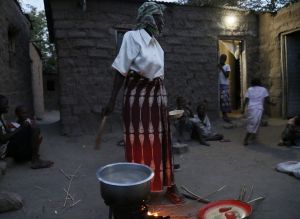
To achieve those goals, which include universal access to clean cooking solutions by 2030, the Alliance recognizes it must develop a sustainable industry that leverages mission-driven public resources to attract private sector innovation and capital. It is clear that while ambitious goals have been helpful in generating support for a cause, turning a vision of impact into reality can be challenging. This framework provides an approach that helps IIAs better identify, prioritize and choreograph their activities.
“We hope these insights lead to more constructive conversations between IIAs and their stakeholders that focus not just on milestones and deadlines, but on what needs to be done to accelerate an entire industry,” Fay said.
The Stanford Social Innovation Review is a quarterly magazine and website about social innovation published by the Stanford Center on Philanthropy and Civil Society at Stanford University.
Both images courtesy of Russell Watkins, Department for International Development (DFID).
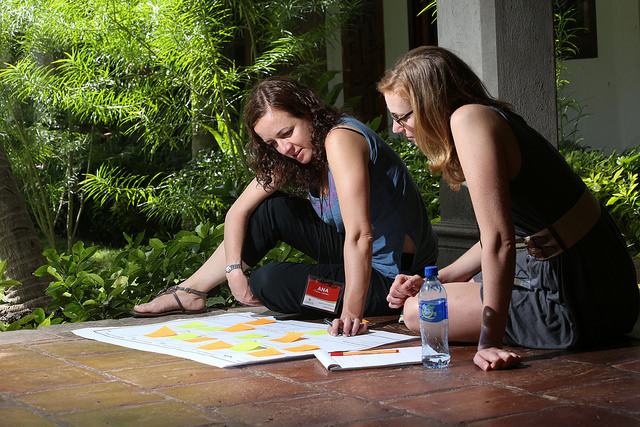
Mary Fritz, pictured right, in Nicaragua for Agora Partnerships.
When Mary Fritz thinks back to her 2012 WDI summer internship in India, she remembers the oppressive heat, the bugs, her illnesses, her inability to communicate, a lack of cultural context, being the constant object of fascination of the locals and taking a shower by pouring water over her head. In short, Fritz said, she was “missing my U.S. life.”
So it might be surprising that Fritz, who has since built a young career helping launch startups in Latin America, fondly refers to this time as an “amazing, multifaceted experience that really shaped me on a lot of levels.” She said her summer in India made her stronger and more independent, flexible, and patient.
“India is extraordinarily beautiful and diverse, and farther removed from Western culture than I had ever been before,” Fritz said. “I learned to be constantly (both) physically and emotionally, uncomfortable. I learned how to be alone. I learned to take bucket showers. I learned a little bit of Hindi.”
Along with the life lessons were plenty of business lessons as well.
“I learned the importance of including the customer in every strategic decision,” she said. “I learned humility. I learned how to connect with people without shared language. And I learned that sometimes you just can’t.”
At the University of Michigan, Fritz enrolled at the Erb Institute, a dual degree MBA/MS program with the Ross School of Business and the School of Natural Resources and Environment. She said she chose U-M for her graduate studies because of the university’s commitment to impact. She also was familiar with WDI’s support of student programs before arriving on campus.
“I’ve always been really interested in social enterprise as a way to address social, economic, and justice issues,” Fritz said. “I wanted to learn what really goes into building an impact company from the ground up, and WDI gave me that opportunity.”
Fritz worked with the social enterprise Wello, which makes water transportation products, including the WaterWheel, designed to help mostly low-income women collect and carry water long distances. Founded in rural India by Cynthia Koenig, a former WDI summer intern as well, Wello has now expanded to Pakistan, Malawi, Zambia, Bangladesh, and Haiti.
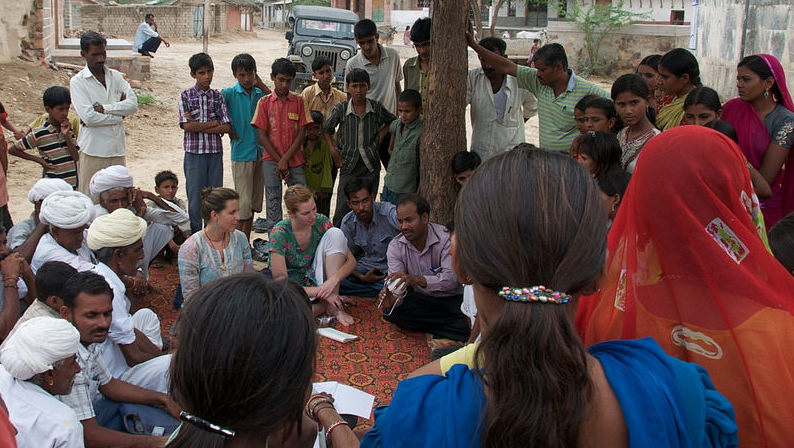
Mary Fritz, wearing a green shirt and white pants, speaks with potential Wello customers. She is seated next to Cynthia Koenig (pictured left), CEO of Wello.
Fritz was based in Mumbai, with frequent travel around the Indian states of Rajasthan and Gujarat. Because Wello was a fledgling startup with a small staff, Fritz worked on a bit of everything. But her main focus was how to get the product to the people who needed it at a price they could afford. There were a lot of manufacturing details to work out, as well as market research and customer interviews to conduct, pricing models to build, and distribution channels to develop. She also studied how to measure impact.
After graduation, Fritz took those valuable lessons and work experiences and began building and launching startup organizations focused mostly on Latin America for Agora Partnerships, a business accelerator. She recently moved to Seattle to work for Lenati, a marketing and sales strategy consulting firm. She will continue to work with startups and nonprofits as well as corporate clients.
“My experience with Wello has definitely influenced my career choices,” Fritz said. “From a functional standpoint, I became really interested in everything that’s involved in bringing a product to market. And I loved working in a startup; every day is different.”
And more than four years removed from that summer in India, Fritz said she still harkens back to those days when faced with a current-day challenge.
“Wello was my first, and definitely most intense, experience conducting customer research and trying to create a human-centered approach to a go-to-market strategy,” she said. “I use those lessons all the time.”
And despite the hardships of that sometimes uncomfortable summer in a faraway land, the internship nevertheless stoked a yearning to work internationally.
“From a personal standpoint,” Fritz said, “it definitely increased my desire to travel and experience cultures beyond my own.”
Note: This is one in an ongoing series of articles profiling past WDI interns and Multidisciplinary Action Project (MAP) team members and their career paths. Additional profiles in the series may be found here.
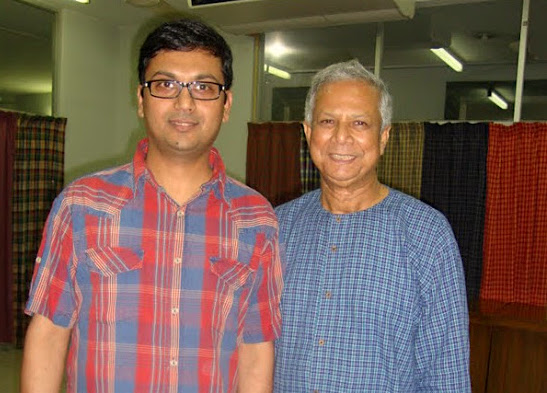
Kallol Mukherji with Nobel Peace Prize winner and Grameen Bank founder Muhammad Yunus.
For Kallol Mukherji, not getting hired in 2009 for a research assistant job at WDI led to a “life-changing” career in global health.
“While I did not get hired for that specific job, the interview process introduced me to the wonderful work that WDI does in providing market-based solutions in emerging economies,” said Mukherji, at the time a graduate student at the University of Michigan’s School of Public Health. “The core base of the pyramid (BoP) work was of interest to me, but what intrigued me most was the private sector-based solutions to real world challenges.”
Despite the early rejection, Mukherji stayed in touch with the Institute. When he saw a 2010 WDI summer internship opportunity with GE Healthcare that “suited my profile to a tee,” he applied and, in his words, was “second time lucky.” He got the internship and was dispatched to Bangladesh.
At the time, GE Healthcare was partnering with the Grameen Foundation to strengthen its healthcare delivery model in rural Bangladesh, with an emphasis on maternal and child health. Mukherji’s task was to create a referral network around existing Grameen health clinics, establish the process flow and define success indicators of the GE/Grameen partnership.
“This was a fantastic opportunity for me to use my public health skills along with designing a market-based solution in a fragile health system,” Mukherji said. “The opportunity to work with a team led by a Nobel laureate (Grameen Bank founder Muhammad Yunus) was an equally good incentive, too.”
Mukherji said the WDI internship was “life changing,” and he was thrilled to travel to Bangladesh for the first time and visit the country where his grandfather had been born 100 years earlier. While he had previous public health work experience, the domain and environment the internship provided was unique, he said.
“Working with multiple variabilities of a mixed health system and catering to the needs of a very diverse pool of stakeholders was an exciting experience for me,” Mukherji said. “Getting exposed to cutting-edge technologies that GE brought to the table and finding their suitability in resource-constrained settings with support of a passionate team from Grameen was an exhilarating experience. The project brought to the fore the value of collaboration and how each stakeholder’s strength could be used for the benefit of common good.”
His summer of work impressed GE Healthcare and Mukherji was offered a full-time job when he graduated. He worked on the company’s Healthymagination initiative for nearly five years on three different continents.
“Without the WDI opportunity, a lot of this would have been very difficult to make happen,” he said. “The internship was, in many ways, a turning point in my career, and it nudged me to look for market-based solutions in resource-constrained settings irrespective of the complexity of the challenges.”
Mukherji currently is based in Washington, D.C. and is the senior manager of Integrated Service Delivery for Population Services International (PSI), a global health network of more than 50 local organizations focused on issues such as family planning, HIV and AIDS, barriers to maternal health, and the biggest challenges to children under five, including malaria, diarrhea, pneumonia and malnutrition. He says his work connects well with his duties as a WDI intern.
“My primary goal is to align our service delivery model in developing countries to ensure quality healthcare services for the BoP population,” he said. “Delivering healthcare services to over 9 million clients per year and ensuring continuity of care in a mixed health system are two areas I feel passionate about and am thankful to PSI for providing an opportunity to positively impact such a diverse population.”
Mukherji’s goal as a graduate student was to work globally, and to date, he’s worked in 13 countries.
“The WDI internship not just cemented that desire but also taught me a completely new approach in solving developmental challenges in emerging markets,” he said. “The role of the private sector as a market enabler to solve real world challenges would most probably have been left out from my possible solution basket for developmental good had I not been part of the WDI internship.”
He said to this day he continues to draw inspiration for his current work at PSI from his WDI internship and work with GE Healthcare.
“It surely did provide me the confidence to be able to face public health challenges head-on,” he said. “Had it not been for the internship experience, it surely would have been difficult for a public health enthusiast from Asia to lead an innovative health initiative in Africa as part of a large multinational healthcare company with its headquarters in the U.S.”
Note: This is one in an ongoing series of articles profiling past WDI interns and Multidisciplinary Action Project (MAP) team members and their career paths. Additional profiles in the series may be found here.
After graduating from the University of Texas, Patrick Huang began his career as a management consultant while giving free advice to social entrepreneurs in emerging markets. But he soon wanted to do much more than dole out advice on the side, so Huang decided to get his MBA and join a social impact enterprise in an emerging market.
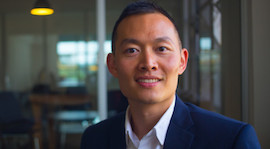
The Ross School of Business at the University of Michigan was at the top of Huang’s list of graduate schools, and “WDI was one of the key reasons,” he said.
“Ross and WDI stood out when I was applying because of its dedicated focus on the (base of the pyramid) in emerging markets through thought leadership and opportunities for students to engage directly in emerging markets through (student projects) and internships,” said Huang, now working with a startup enterprise in Kenya.
He enrolled at Michigan Ross in fall 2011 and that winter took part in a WDI-sponsored Multidisciplinary Action Project (MAP), an action-based learning course in which students work for a company or organization on a special task.
He was part of a four-person team working for the nonprofit charity CARE in Bangladesh, which was tasked with developing a micro-franchise pilot for small-scale businesses that sell agricultural inputs such as seed and medicine for livestock. The business plan included consolidation and coordination to improve efficiencies at the companies.
The team worked in a small farming town a few hours outside the capital of Dhaka. They often sat in huts and interviewed farmers and business owners.
“Although our team and our interviewees came from different sides of the world, we found common ground as we came to understand their challenges, their struggles, and most importantly, their ambitions for a better life,” Huang said.
That summer, he traveled to Mumbai, India as a WDI intern working for Village Capital, a peer-led business accelerator and investment program for early-stage social enterprises. Village Capital was planning to start two business accelerator programs, one focused on enterprises based in Mumbai and another sector-specific program for enterprises across India. Huang’s job was to recruit interested and qualified social enterprises across India to the program.
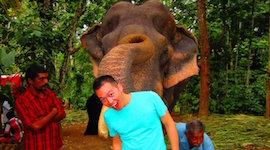
Huang poses with an elephant during his internship in India.
Huang soon discovered he not only had a knack for identifying potential businesses, he enjoyed it. He met with budding business owners, angel investors, and entrepreneur associations. He would meet them for coffee at a local cafe or for drinks during happy hour. He learned about each enterprise’s team, its business model and plans for growth.
“At the same time, I also learned about the city, the people, the culture,” he said. “I traveled across India from historical sights like the Taj Mahal to tea plantations in Kerala, absorbing and trying as much as I could. I sought to not only identify prospective businesses but also refine my own interests.”
By summer’s end, Huang had conducted preliminary due diligence and created a pipeline of 45 prospective early-stage, social enterprises.
“More importantly, I knew that I wanted to work in this environment where the growth of the entire country was almost tangible,” he said.
After graduating in 2013, Huang moved to Nairobi to work as a consultant for small- and medium-sized enterprises (SMEs). He now is chief of staff and principal business development officer at Umati Capital, a financial technology startup that provides financing alternatives for SMEs in agri-business, retail suppliers and consumer goods manufacturers in East Africa.
He said his WDI internship and MAP experiences “refined and strengthened my current passion for entrepreneurship as the driver for economic growth in emerging markets.” He also identified his role in this field – finding areas of collaboration and opportunity.
But to accomplish this with prospective clients in Kenya, he thought back to what he learned during those meetings over coffee in Mumbai and the interviews with farmers in their huts in Bangladesh. What made those projects succeed was Huang’s humility and empathy when interacting with people from a different culture or background. He also practiced “active listening” to show he was attentive and striving to understand. These are traits he applies in his work today.
“Only by understanding these lessons could I identify the common ground that served as our foundation to work together and achieve a common goal,” he said. “With my Ross MBA and my experiences at WDI, I am grateful for that opportunity, and look forward to working with businesses that can generate value for both the shareholders and the society as a whole.”
Note: This is one in an ongoing series of articles profiling past WDI interns and Multidisciplinary Action Project (MAP) team members and their career paths. Additional profiles in the series may be found here.
Karen Tam spent three months in Rwanda during the summer of 2009 as a WDI intern, returning in the fall to the University of Michigan with valuable work experience in a developing country, a lifetime of memories and a Rwandan nickname: Umutesi.
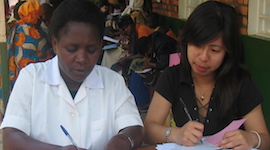
Translated as “treasured or valued one,” the name was given to Tam by both the nurses at the hospital where she worked and her host family. Tam, now a Washington, D.C.-based senior consultant for GE Healthcare’s Camden Group, lived with the family – a surgeon dad, two children and the mother Tam still affectionately calls “Mama Benita, who loved me like I was her own.” Living among the people she was working to serve, led to a better experience and better outcomes, Tam said.
“The best way to understand facing the community and recommend practical, actionable solutions is to get embedded,” she said. “It helps you perform so much better. I was a part of the community.”
Tam interned with the Access Project, which seeks to improve the care provided by medical facilities in Rwanda through investments in management, training and infrastructure. For her internship, Tam developed a business plan for scaling solutions to improve operational efficiencies for access the health clinics, pharmacies, and patient registration.
Tam, who was a dual degree master’s student at the Ross School of Business and the Ford School of Public Policy at the time, had studied abroad in Japan as a high school student and in Greece as a University of Chicago undergrad. But Rwanda was different.
“Working in a developing country, living in a developing country – that was life changing,” she said. “And when you’re working in a developing country, as opposed to just living in one, there are expectations. You have deliverables, you have to perform.”
Tam interned with WDI again the following summer, this time traveling to Bangladesh for GE Healthcare in partnership with Grameen Healthcare. She worked on the rural deployment of handheld ultrasound devices, gathering information on the ground for engineers regarding usability, determining clinical pathways for the machine and finding a sustainable business model to serve the poor while remaining profitable.
Unlike her time in Rwanda, her summer in Bangladesh was far more challenging. The support network she had in Rwanda didn’t exist in Bangladesh. Working for a corporation as opposed to a nonprofit was different. And she faced gender discrimination from some people in the field who preferred to hear from her male colleague.
Still, Tam said she was able to pull out positive learnings from her experiences in Bangladesh and gained new perspectives from the challenges there.
“It allowed me to be completely flexible and adaptable,” she said. “Certain things that offended me in the past, I let slide because I built up this thick skin. It taught me to exercise my abilities, stand my ground and be sure my opinion is heard.
“It upped my emotional intelligence, having to constantly do that on the ground. It helped me move forward in my career.”
Tam’s two WDI internships represented a practical way of combining her pre-medicine education as an undergrad, and her business and policy disciplines.
“On the outside, they can be conflicting,” she said. “But when you apply it properly and you have the right kind of conversation with the right kind of stakeholders, I really think that is super powerful.”
Seven years later, Tam occasionally hears from Mama Benita, who sends photos of her now-grown children. That summer working in Rwanda and living with her adopted family, Tam said, “will always hold a special place in my heart.”
Note: This is one in an ongoing series of articles profiling past WDI interns and Multidisciplinary Action Project (MAP) team members and their career paths. Additional profiles in the series may be found here.
On June 17th, Zara Ahmed will take a moment during her hectic day to stop and think about a young girl living in a small, rural village in southwest Cameroon. It is something she has done every June 17th since 2008 when she was a WDI summer intern working for a public health nonprofit and helped a woman give birth to a baby girl who would then be named after her.
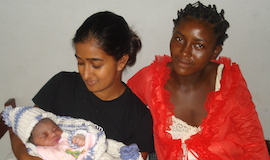
“I think back to that day and wish her a happy birthday,” said Ahmed, now the Senior Policy Advisor for Health Systems and Sustainability for the U.S. Centers for Disease Control and Prevention (CDC) in Haiti. “I wish her a future more like my own, full of opportunity, choice, support, and love.”
Despite Ahmed’s wishes, she realizes it is likely that her namesake will have a difficult life. Baby Zara’s mother was 21 when she gave birth to her third daughter, to go along with one son. Ahmed helped clean the baby after her birth with palm oil, the only clean liquid available at the minimally-equipped, one-nurse clinic.
Baby Zara’s mom was so certain she was going to have a boy that she planned to name him after Ahmed’s brother, Zamir. When Zara was born, her mother was concerned her husband – about 20 years her senior – would not be happy with another girl, and initially ignored the newborn.
Her husband eventually visited and begrudgingly gave his approval. Baby Zara’s mother began to bond with her new daughter, but talked excitedly about giving birth next to a son.
“This experience breaks my heart every time I think of it, which is quite often,” Ahmed said. “Baby Zara was born into a family that had few resources to offer her beyond their love. She was born into a life with few prospects, will likely have little education, suffer from preventable diseases, marry early, and endure risky pregnancies and childbirth of her own.
“She will not be afforded the same privileges I have – proper nutrition, years of schooling, advanced health care, reproductive choices – unless our world dramatically changes for the better.”
Trying to make the world a better, healthier place has been Ahmed’s work since graduating from the University of Michigan in 2009 with dual master’s degrees in public policy and public health. After graduation, she spent several months in Bangladesh as a consultant with the U-M President’s Advisory Committee on Labor Standards and Human Rights looking at issues of female migrant worker rights and conditions in the factories where U-M-branded goods were produced.
While in Bangladesh, she was selected for a CDC global health fellowship. She took a position on the CDC’s Health Systems Strengthening team in Rwanda in fall 2009, and on her first day was put to work on the then re-emerging H1N1 swine flu outbreak. Two days later she was part of the group briefing the country’s Minister of Health.
She was later named Health Systems Strengthening Advisor and became a CDC contractor. After three years in Rwanda, she moved to Namibia to become the CDC Health Policy and Communications Team Lead. Two years later, she moved to Haiti and assumed her current role.
All this moving around is nothing new for Ahmed, who was born in Scotland, moved to the U.S. at age 3, went to Brown University in Rhode Island for her undergraduate studies and then to U-M. “At 31, I am currently living in my 27th house so I’ve gotten quite good at packing and moving,” she said.
She originally came to Michigan to get dual degrees in public policy and social work. But she soon realized that the intersection of public policy and public health “spoke to my real interests and passions.”
During her second year at U-M, Ahmed was looking for funding for a public health internship and talked to several friends at the Ross School of Business who spoke highly of WDI and its support for students – particularly those pursuing innovative collaborations or projects.
“From the start, the team at WDI was extremely supportive, professional, and enthusiastic,” Ahmed said. “It felt like a perfect match for me.”
Her 2008 WDI-supported internship was with a group called Peacework based in rural, southwestern Cameroon along the Nigeria border. Working through a local partner, United Action for Children, Ahmed’s primary job was to assess the local public health capacity. She used information on burden of disease, demand for services, availability of resources, and other factors to develop a plan to revitalize health clinics that had lost their funding due to donor withdrawals.
She explored several models, including community-based financing and public-private partnerships. She interviewed dozens of patients and providers, and visited approximately 20 health clinics, often walking from village to village because most of the roads were washed out. She regularly spent several days at a stretch in a single clinic, sleeping on a cot or the floor.
The daughter of a physician and a medical practice administrator, Ahmed thought she was familiar with the basics of health care financing and management going into her internship.
“The daily issues that come up when running a one- or two-person health center in a remote village are hard to imagine until you’ve seen them up close,” she said. “More than interviews with staff or reviews of facility records, simply observing the rhythms of the clinics, the comings and goings of patients and friends, the role clinics play in villages of a few hundred people, and the innovative problem-solving of the staff taught me so much about leadership, management, and resilience. Those observations provided a crash course in the business of health care at the most decentralized level where people’s critical, basic needs are met.”
Those experiences in Cameroon – coupled with Ahmed’s other international experiences at U-M in Cambodia, Bangladesh and Senegal – continue to inspire and provide guidance in her current role at the CDC. Today, she is engaged in all aspects of policy, planning, strategy, and coordination of CDC’s work in Haiti. As a result, she works closely with CDC Haiti’s management, technical, and operations teams and the organization’s headquarters in Atlanta. She also interacts with numerous U.S. government agencies, such as USAID and the Departments of State, Defense, and Treasury, and global partners such as the World Bank, World Health Organization, and the Global Fund.
Ahmed said she often reflects on “the twists and turns of fate” that got her to Haiti, including her WDI internship in Cameroon. That experience, along with the others, “grounded me in the realities of global health, policy, and development, and gave me insight into various ways of thinking about issues across cultures and professions. Those skills and experiences made me a much better candidate in the job market, as I truly grasped the challenges and opportunities facing organizations like the CDC,” she said.
Her globetrotting ways are not for everyone, she said. Living and working overseas can be lonely, isolating and exhausting. But it also can be rewarding, stimulating, and enlightening. In the end, she said, you never know if living and working abroad, with its new situations and cultures, is for you until you try it.
“When I was a student at U-M applying for internships, never could I have imagined that I would be trudging through muddy, washed-out roads in the forests along the Cameroonian-Nigerian border having just helped deliver, in a one-room health clinic, a baby named after me,” she said. “That fact alone is proof that I don’t know what’s in store for my life and career, and something that I think about to this day.”